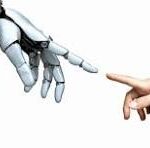The Nature of the Human Mind and AI
Hi folks welcome to my website and U Tube channel I hope you are all well and happy. My name is Rodd, and I am the host of these presentations.
Today, I intend to expand on my earlier blogs and web presentations, particularly those concerning the Russian psychologist and philosopher L. S. Vygotsky. In that presentation, I highlighted Vygotsky’s emphasis on the influence of capable adults and cultural context in the development of higher mental functions such as reasoning, decision-making, memory, and language. He suggested that language is likely a capacity unique to humans.
Another aspect of the mind is consciousness. The evolution of this phenomenon stays uncertain, and there are no definitive explanations, including scientific ones, about its development. Ther are a few variants on what consciousness is though it has evolved for survival benefits, yet finding brain processes supporting it is challenging. Some philosophers such as Thomas Nagel consider it a nonphysical epiphenomenon. David Chalmers suggests that though currently a mystery, he argues it could be explained by natural laws in the future.
An important aspect of consciousness is an awareness of oneself (self-consciousness) being aware of the actions we are taking at performing a task whether cognitive or physical action.
It is difficult to say if other animals, especially mammals such as primates, have such self-awareness. My view is that they have but I am not Jane Goodall. Many scientists now study primate consciousness. You may want to look them up. A list of some of these:
Catherine Hobaiter is a Reader in Origins of Mind at the University of St Andrews in Scotland.
Geresomu Muhumuza is the Head Chimpanzee Field-Assistant at the Budongo Conservation Field Station in Uganda and has collaborated with chimpanzees in the Sonso community for 30 years.
Moreen Uwimbabazi is a Forest Ecologist with the National Forestry Resources Research Institute. She conducted her PhD on Nutritional Ecology of female chimpanzees in Kibale National Park.
Inza Koné is a Primate Conservation Biologist, President of the African Primatological Society, Co-Vice Chair of the Africa section of the Primate Specialist Group of the IUCN, a member of the conservation and education committees of the International Primatological Society, a Senior Lecturer at the Université Félix Houphouët-Boigny, Abidjan
John Walter Akankwasa is a Ugandan Wildlife Biologist working with the Budongo Conservation Field Station.
The brain enables these abilities of the mind, however without the input from socialised others and cultural norms, such abilities would not occur. This impact of culture is recognised by many evolutionary biologists, including Richard Dawkins (pictured below) a world-famous evolutionary biologist (and a prominent atheist) who himself created the notion of memes as an essential input in the evolution of the human species.
My goal is to explore the development of the human mind from a Vygotskian perspective and its potential relationship with artificial intelligence. I am not presenting an academic article but rather sharing my views in a non-academic manner. Despite the extensive literature, I want to share my thoughts and invite you to join the discussion.
I will begin with some observations about the human mind what it is and what is does. While doing this, I will compare the potential differences between the human mind and artificial intelligence on these aspects of human consciousness. I plan to finish by seeing what the possibilities of AI might be.
What is the Human Mind? What Function Does it serve in Our Lives? Some Observations of the Minds Capacity and Content
1. Our minds attribute mental states to others
Philosophers have studied the nature of the human mind for centuries and philosophy of mind is a well-known academic specialty. There has been debate over centuries about what the mind is; some using the term psyche to express the same thing. Others, with religious backgrounds have suggested the mind is akin to the soul. Such a view suggests a supernatural element. Most us skeptics reject this as unscientific with no evidence at all to support such a notion of a non-material entity.
Having said that we do or can develop abilities that may appear supernatural. As I will argue, having a mind assumes we have a view of others as also having a mind like we do. And those others we deal with have input from the same culture that we have in common. In a sense, the mind owns a universal character that everyone accesses. This enables us to assume or predict how others will act in certain situations. It is a variety of mind-reading that does no need to bring in supernatural entities.
The idea we have minds is very well known by all of us, as we use the term very often in our everyday speech. For example, this is me in a hat and wig. I know this outfit looks unusual and it’s not my everyday wear, but I have received comments.

Have you lost your mind?
or
Are you out of your mind?
I really am just having fun, and many friends realise this, but what these comments mean is that I am acting out of character or that this behaviour does not fit the image they have of me.
This reveals something important about the mind and that is out minds reveal our identity as a person. Others have attributed to me a certain identity or personality, or if you like, a mind that is uniquely mine. Thus, an important aspect of the mind is that others recognize that other people have a mind as they do. It is a variety of mind reading as we have attributed a mind like ours to others. We can put ourselves, as it were, in the shoes of others. For example, my Neighbor called at my front door last week to borrow something and was dressed in greasy overalls. I at once knew he was working on his vintage cars as he is a sort of crazy car freak and works on cars in his garage. You can predict others’ actions by remembering their interests and seeing their behaviour. Prediction of what another might do, what action they may take, is an important part of having a mind. According to many scholars, AI is currently unable to predict human behaviour with the same accuracy as humans can.
My prediction about my neighbor’s activities was based on my recollection of him and his interests, showing a crucial aspect of the human mind. This ability to expect and interpret the actions of others based on our accumulated knowledge and experiences is a hallmark of human cognition. Our minds work not just on a superficial level but delve deep into past interactions with my neighbour, and the cues he gives. Unlike AI, our minds are not merely programmed to respond to inputs but can create an understanding and empathy of his situation. This shows us something of the unique nature of human consciousness that is an aspect of the human mind.
<strong>2 The mind reasons and makes decisions about actions a person is to take. This requires language acquisition.
You often hear people make this type of comment.
I have made up my mind to do this…\
An important feature of the mind is that it can evaluate options and decide on actions. Thinking about options is a central feature of the mind. And this aspect of mind is bought about by language acquisition.
Consciousness, language acquisition and those other aspects of the mind mentioned above are internalized by humans. Babies and young children need to develop these skills through cultural assimilation and interaction with socialised adults. However, the human brain has a ‘wired in’ ability for language acquisition. Linguists such as Noam Chomsky have found that the human brain has developed this ‘wired in’ ability to lean grammatical language and all that comes with it, thinking, calculating, planning, decision making, predicting and other human cognitive abilities.
3. The emotions and the mind
An essential part of the mind is known as emotions
affect. This also includes our values that play a
important part in our decisions and thoughts.
Emotions are often viewed as a hindrance to cognitive activities because they can introduce irrationality into logical thought. For example, the empiricist position in science is that scientists must learn to ignore any possible emotional interference with their observations. Thus, empiricists have always aimed to ‘tell it like it is’. This implies that one can (by training) observe external phenomena without personal bias or ignore one’s emotional perspective that will distort the actual objectivity of the phenomenon being observed.
I have often wondered about this empiricist position. Is it possible to ignore one’s emotions or affect in any observation? Do emotions influence your choice of research topics, your interests? Surely, they do.
However, some recent research has However, recent studies have shown that the effects and functions of emotions impact on cognition in complex ways than just irrationality and bias. Recent research suggests that mood can influence memory, and emotions are important for perception, attention, executive control, and decision making.
My view is that the impact of emotion can be unconscious in that certain factors of which we are not conscious can impact decision-making. The role of language in emotion perception. For example, facial expression recognition research suggests there are specific emotion categories that are universal across human races and nationalities. Facial expressions are easy for all people to recognize. This shows the perception of emotions makes language unnecessary.
Another important aspect of the interrelation between cognition and emotions is that emotions are not devoid of cognitive input. Emotional regulation refers to the processes by which we control which emotions we have, when we have them, and how we experience and express them. Research recently has shown that brain regions associated traditionally with emotions are also involved in affective processes. Therefore, each cognitive or affective area of the brain is not exclusively cognitive or effective but has input from both cognition and emotion.
AI and especially computer research has also neglected emotional aspects as irrelevant to what computers do. The question is here is can computers or AI technology have emotions, detect emotions. Can we develop Computers and AI machines to respond to emotions and influence humans emotionally?
There is now a considerable body of emerging, with some research groups and institutions spcialising in the interrelation between emotions and cognition (e.g. MIT Media Lab, The Swiss Center for Affective Sciences, The Chinese Academy of Sciences. They aim at giving computers the ability to sense, recognize, and respond to certain aspects of human behaviour.
To me this aspect of emotional recognition and responding to emotions in machines indicates that such machines not only have some emotional understanding but maybe can experience emotional responses themselves. Experiencing emotions involves feeling them. Do you think machines can feel emotions? I’m not sure there is much research currently on machines having emotions. I would be interested in your ideas and thoughts on this.
What can we expect of AI machines? Can AI machines do better than humans?
• AI machines can perform some very complex cognitive functions much faster and more efficiently than humans. This included searching (search engines), computation, text editing, calculation, analyzing data, on-line shopping and navigation, prediction, detection and prevention of fraud. All of this makes life easier and enables complex actions humans can’t emulate.
• AI machines such as Robots can perform certain physical tasks mote effectively than humans. This will include robots performing factory work, self-driving cars (some current problems with this that require ironing out) and playing games such as chess.
• The future will surely include improvement of all these cognitive and physical tasks and include new functions yet unknown.
What AI cannot do.
• AI struggles with questions that require subjective judgment or opinion, such as matters of personal taste, ethics, or moral dilemmas. These phenomena lack a single or correct answer.
• AI currently has limitations in areas such as creativity, emotional intelligence and or moral issues. AI machines do not have certain emotional capacities. AI machines can’t feel empathy or sympathy for another being It can’t undertake complex decision-making that requires human judgment.
• I would also add that AI machines are not conscious. They lack self-awareness. AI cannot answer questions that require subjective judgment or opinion, as there are many moral questions that do not have a single answer, such as matters of appreciation of art, architecture, music.
The Future
This is very difficult to predict. We can say it will become more proficient in what it already does. It’s challenging to create consciousness in AI because there’s no consensus on what consciousness is or how the brain produces it.
Many argue that there are dangers, such as AI machines taking over from humans making them superfluous. I personally can’t see this occurring as it assumes that human beings will remain as they are now. We humans are the product of an evolutionary process and our capacities have evolved over long periods of time by natural selection. Natural selection is a natural process that preserves traits that allow a species to survive and preserve its genes.
Evolution will continue, potentially changing human beings cognitive and behavioural capacities, leading to a more complex species (or different species, not necessarily better) in the future.
AI machines have not come about by means of natural selection, they have been created by humans as a tool, an artifact to make us more efficient and better at what we do. We can ask if AI machines acquire the capacity to make evolutionary type changes to themselves.
Several scholars contend that advancements in future research will enable us to comprehend the natural mechanisms that produce consciousness.
Consequently, it may become possible to design machines endowed with consciousness and the other capacities humans have. Or, perhaps AI machines will be created to enable them to endow themselves with a form of consciousness and a mind. The proposal that AI machines can endow themselves with mind or consciousness is unanswerable right now. Such machines would have acquired the knowledge of how consciousness is produced; knowledge that we humans do not have just yet.
Please express your views on this in the comments section.




